Chesapeake Bay's Independent Newspaper ~ Since 1993
1629 Forest Drive, Annapolis, MD 21403 ~ 410-626-9888
Volume XVII, Issue 52 ~ December 24 - December 30, 2009
Home \\ Correspondence \\ from the Editor \\ Submit a Letter \\ Classifieds \\ Contact Us
Dining Guide \\ Home & Garden Guide \\ Archives \\ Distribution Locations \\ Advertising
![]()


![]() Spotlight on Theatre
Spotlight on Theatre
Harvey Makes for Joyous Company at Bay Theatre
reviewed by Davina Grace Hill; December 17, 2009
1944 was a grim leap year with battles raging from Stalingrad city to Normandy beaches. It was also about two decades after Freud’s ideas entered the mainstream. That intersection gave newspaper writer Mary Chase the idea for her much-needed fluffy diversion, Harvey.
Who doesn’t know that Harvey is a Pooka, an imaginary six-foot rabbit that accompanies Elwood P. Dowd everywhere, much to the consternation of Elwood’s family. His sister tries to commit him, but after many confused identities and cross-purposes, Elwood’s sweet, innocent nature wins the day. He and Harvey presumably live happily ever after.
|
![]() Harvey is great fun but not a great script. There are inconsistencies and plot flaws. Yet it won the Pulitzer Prize and reached great acclaim — primarily because of the acting brilliance of Frank Fay, who originated the role on Broadway, and of James Stewart on film.
Harvey is great fun but not a great script. There are inconsistencies and plot flaws. Yet it won the Pulitzer Prize and reached great acclaim — primarily because of the acting brilliance of Frank Fay, who originated the role on Broadway, and of James Stewart on film.
Bay Theatre creates a very successful Harvey, also because of Jim Chase’s brilliant portrayal of Elwood. Chase has an uncanny ability to deliver a line as an aside to the audience while remaining fully immersed in his scene. He captures his character completely and utterly. You will take this leap of faith and bask in both Elwood and Harvey’s joyous company.
Harvey has enough cleverly written and well delivered lines that the Bay Theatre was convulsed with loud, full belly laughs. Performers make this show.
As Dr. Chumley, the renowned psychiatrist undone by Harvey, Gene D’Alessandro goes from self-righteous to confused in a delightful portrayal. Brandon McCoy as Dr. Sanderson, Dr. Chumley’s associate, keeps the momentum going in a shy, understated manner.
Eliza Bell as Nurse Kelly and Joe Cronin as Orderly Wison round out the hospital cast with expressive vocal and physical abilities.
Annapolis favorites Edd Miller as Judge Gaffney and Sue Struve as Mrs. Chumley easily show why quality work is always expected from these local veterans.
Lois Devincent as Ethel Chauvenet (a society lady) and Brianna Letouneau as Elwood’s niece Myrtle Mae are quite effective, though Devincent can’t help but be upstaged by her audacious feathered hat.
As Elwood’s distraught sister, Lucinda Merry-Browne has some great moments, though her emotional relationship with Elwood isn’t fully established.
Phil Amico has the necessary gravitas to pull off the last-act role of the cab driver who explains the moral of the story.
Ken Sheats creates an effective set that visually echoes the possibilities of the mind; it has a wall that revolves and another that splits apart, both interlocked and yet distinct.
Director Rick Wade sometimes allows his cast to go over the top on humor and the pacing in Act One is a tad slow. But the overall effect of the evening is merriment and good tidings. What else is appropriate this time of year?
Oh, and rumor this summer had it that Steven Spielberg was planning a remake of Harvey. He apparently cancelled his plans because he couldn’t find an actor to play the iconic role of Elwood. Too bad he never saw Jim Chance.
Playing thru Jan. 10 at 8pm ThFSa; 3pm Su & Sa Jan. 9 @ Bay Theatre Company, West Garrett Building, Annapolis. $30 w/discounts: 410-268-1333.
Masqueraders’ Fortinbras
This smart, sexy, sensational satire shows a new side of the Naval Academy
|
|
reviewed by Jane Elkin; 11/19/2009
![]()
Lee Blessing’s comedy Fortinbras — one of Time magazine’s 10 best plays of 1991 — is this year’s must-see at the Naval Academy. It’s the right show at the right time with the right people: a smart, sexy and sensational satire starring the best cast the Masqueraders have assembled in years. Plus, thanks to body mikes and some structural renovations to the Mahan Hall auditorium, nearly every word comes through loud and clear.
Fortinbras (Mike DiDonato) is an expendable afterthought in Shakespeare’s Hamlet, the conquering successor to the slaughtered royals of Elsinore Castle. But there is nothing forgettable about him in this updated sequel. He’s an uneducated reactionary, a preening, narcissistic dictator courting popularity through public relations and foreign policy.
Thus when Hamlet (Benjamin Ball) begs Horatio (Ryan Mati) to tell his tale, Fortinbras objects and rallies the buffoonish toady Osric (Mark Pfender) to do his bidding. He instead blames two fictional Polish spies (Margaret Gates-George and Judy Valderrabano) for the carnage, thus ensuring popular support for his campaign of manifest destiny. Think Normark or Denway. After all, “the truth is pretty incredible,” he reasons, and “I’m not here to finish their story. I’m here to tell mine.” Or so he thinks, until the castle’s ghosts start haunting him.
Hamlet (trapped in a TV screen) and Polonius (Kevin Williams) are clamoring for his conscience even as the succubus Ophelia (Sierra Cox) claims his body. Others are more concerned with unfinished business from the first play. Claudius (John Tanalega) and Gertrude (Kristen Eriksen) are really sorry, in an existential sort of way, and Laertes (Collin Grier) is still ticked off about how Hamlet spurned his sister and accidentally killed him and his father. If all this sounds too complex, fear not. Even a Hamlet neophyte could follow this story.
The production is a cornucopia of creativity, from the ornate green marble castle to the Shakespearean, Viking and Punk Rocker costumes. The music is modern classics of timeless themes that serve as character anthems: “When I Ruled the World” for Hamlet, “Single Ladies” for Ophelia, “I’ll Be Watching You” for Polonius and “Ghost Busters” for the assembled dead.
The cast is, on the whole, excellent, particularly the four leads, DiDonato, Ball, Mati and Cox, who are so entertaining and convincing it is easy to forget they are midshipmen with demanding course loads. Other cast members who play multiple roles include Michael McPherson, Matthew Balini, Kyle Hanton and Melanie Arden.
Midshipmen are an overworked and sleep-deprived lot. Yet nearly half the cast has a B or above average. In the two and a half months of the fall production — which substitutes for a required intramural sport — these midshipmen add new depths to their education and prepare a public service, according to director Christy Stanlake. Thus, in a time when Superintendent Jeffrey Fowler is calling for renewed commitment to academics, this is a group of which he can be proud.
Masqueraders do their audience proud, too, by bringing Annapolis an edgy production of an edgy play, as only young intellectuals can.
Playing Nov. 20 & 21 at 8pm @ Mahan Hall, U.S. Naval Academy, Annapolis. Bring photo ID and walk in by Gate 1 or shuttle from stadium. $10: 410-293-8497.
2nd Star Productions’ Brigadoon
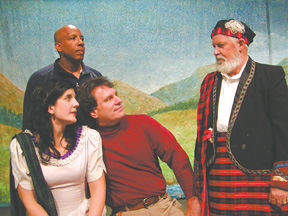
photo courtesy of 2nd Star Productions |
Brigadoon may vanish, but 2nd Star retains its charm
reviewed by Davina Grace Hill; 11/12/2009
Alan Jay Lerner and Frederick Loewe wrote Brigadoon shortly after atomic bombs helped end World War II. No wonder they created a musical fantasy about a town that seeks to remain forever unchanged by the outside world by appearing once every century.
Gender attitudes show Brigadoon’s 60-plus year age, but for the most part its beautiful music and longing for certainty in a rapidly changing world remain powerful in a new century. This musical has challenges as well as delights — Scottish accents, balletic and sword dancing and bagpipers — that keep productions infrequent, though not so infrequent as Brigadoon’s appearances. 2nd Star Productions meets three and a half of those four challenges.
Several dance sequences originally choreographed by Agnes deMille without vocals are not typical in modern musicals. Choreographing for 2nd Star, Christine Asero makes the most of the talents of her dancers as well as tight space. Most evocative is seventh-grader Vivian Wingard’s funeral dance.
Director Jane B. Wingard’s well-directed action also makes the most of the stage. The set is well done and scene changes quick. Kudos to the set crew, who rarely get the credit they deserve.
Acting is uniformly strong and often thrilling. Wendell Holland as Jeff and John Day as Tommy are the two Americans who stumble upon Brigadoon in a centennial appearance. Holland adds comedic timing to leading man Day’s effective singing and strong stage presence.
Barbara E. Hartzell as Fiona, the lass Tommy falls for, has a beautiful voice and strong acting skills. Playing the couple to be married, Nic Petersen (who shares the roll with Neil Puzon) brings his powerful, clear voice and stage presence to Charlie, and Sammi Thornhill is utterly believable as the glowing young bride Jean.
Martin Hayes imbues his schoolteacher, Mr. Lundie, with the requisite gravitas in an expository role. As the angry young Harry, whose unrequited love for Jean threatens Brigadoon’s survival, James Poole is almost James Dean in a kilt. That brooding doesn’t hit the right notes to make his character effective.
The only major disappointment is the lack of mist; without it, the dark lights tipped the lighting from atmospheric to just too dark.
Having a live orchestra in a community theatre production is a wonderful thing, though on opening night the string sections didn’t measure up to the tone and focus of the winds and brass.
As for brogues and bagpipes, 2nd Star manages admirably. The daughter of a Scot, this reviewer is familiar with Scottish brogues and speech lilts. American actors have difficulty with inflections, but here dialogue is understandable, an acceptable compromise to a valiant attempt. The sword dance and the bagpiper added impressive aspects of authenticity. A bagpiper piped us down the wooded path to Bowie Playhouse, setting the mood.
Brigadoon may vanish, but 2nd Star retains its charm.
Playing thru Dec. 5 at 8pm FSa; 3pm Su @ Bowie Playhouse, White Marsh Park, Bowie. $20 w/discounts: 410-757-5700; www.2ndstarproductions.com.
Colonial Players’ The Violet Hour
Would you look into the future to see the consequences of your choices?
reviewed by Davina Grace Hill; 10/29/09
The Violet Hour takes its name from that dusky twilight hour when light blends into a violet darkness, warmth into coolness, certainty into shadows.
Set in New York City in the spring of 1919, Richard Greenberg’s play continues its namesake theme of transitions into a city rapidly expanding and a time of rapidly changing social attitudes (think Prohibition, Roaring Twenties around the corner and the Harlem Renaissance beginning).
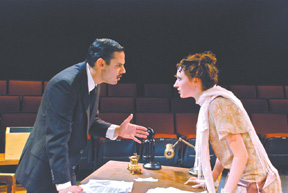
photo by Colburn Images |
![]() The story revolves around a would-be publisher, John (Pat Reynolds) who must decide which book he can afford to publish. He has two choices of author: Jesse Brewster (Lolita-Marie), a singing sensation and his girlfriend, who craves wider fame; and Denny (Alex C. Vaughn), a thinly disguised F. Scott Fitzgerald, whose three-crate tome promises greatness for both writer and publisher.
The story revolves around a would-be publisher, John (Pat Reynolds) who must decide which book he can afford to publish. He has two choices of author: Jesse Brewster (Lolita-Marie), a singing sensation and his girlfriend, who craves wider fame; and Denny (Alex C. Vaughn), a thinly disguised F. Scott Fitzgerald, whose three-crate tome promises greatness for both writer and publisher.
Denny needs a publisher to keep his love, Rosamund (Megan Therese Rippey) from marrying another man. Jesse wants to be published so that she won’t be forgotten. Weaving through these characters is John’s office assistant Gidger (Tom Byrne). A pivotal character is the office machine that arrives unexpectedly at the end of Act I.
A literal deus ex machina, the machine spews out papers. Unaccountably, what it is printing are books that have not yet been written, giving John and Gidger a glimpse into what will happen to all the five characters in The Violet Hour.
John reads about Rosamund’s madness, Denny’s tragic fate, Jesse’s life reinterpreted and his literary role misinterpreted. When he tries to change the future by changing his decision about which book to publish, the result for the characters worsens.
The Violet Hour’s leap into science-fiction supposition is tricky. The script creates this challenge but provides little guidance on how to make the shift smoothly. First time Colonial Players director Josh Bristol’s realism doesn’t quite make the mark.
Casting this production differently might have strengthened it. Four actors, as well as the director, debut with the Players. All five actors are quite good, but two (Tom Byrne and Lolita-Marie) are such confident stage presences that they tend to overpower the others.
Reynolds’ John is quite believable as he realizes his gift is two-sided. Lolita-Marie is utterly convincing as Jesse. Vaughn’s Denny conveys the grace of an emerging artist and the youthful conviction that life offers only one option at a time. Rippey portrays the fragile Rosamund so that one can see what is in store for her. Byrne’s Gidger is a strong force — so strong it can distract from the other actors.
Once again, Colonial Players challenges itself — and you.
Playing thru Nov. 14 at 8pm Th-Sa; 2pm Su; 7:30pm Nov. 1 @ Colonial Players, Annapolis. $20: 410-268-7373.
The Long Road of Brundibar and Ela Stein Weissberger

photo courtesy of Children’s Theatre of AnnapolisAbove: Nick Brice as Little Joe, Jeff Miller as Brundibar, Liza Bedlin as Annette. |
From Terezin Concentration Camp to Children’s Theater of Annapolis
previewed by Jane Elkin
Sixty-five years ago this month, an extraordinary event transpired at the Terezin Concentration Camp near Prague, Czechoslovakia. It was the 55th and final curtain for Brundibar, a popular children’s operetta by Hans Kraza, featuring 20 of his protégés and fellow prisoners. After the show, Kraza — like most of the cast before him — was sent to Auschwitz and executed.
Just a handful — blessed with beautiful voices, luck and pluck — beat the 99 to one odds of extermination. One, Ela Stein Weissberger, acted in every production of the show’s 13-month run. Now she is coming to Annapolis.
The Children’s Theater of Annapolis is celebrating its first half century with Brundibar and an appearance by Weissberger. This play was chosen because it embodies the company’s mission: “education through the arts.” The anniversary also features readings and an exhibit with works from I Never Saw Another Butterfly: Children’s Drawing and Poems from Terezin Concentration Camp 1942-1944.
That posthumous collection was possible because many of Prague’s artistic elite taught in Terezin’s clandestine school and hid student poems and drawings in suitcases, walls and floorboards. Weissberger loved the simple routine of going to school, and for her and her peers performing was an escape from a grim reality. Brundibar is now performed all over the world, and wherever Weissberger goes, she tells children that the opera’s survival represents the undying spirit of her friends.
This story of teamwork and triumph is about two children raising money for their ailing mother by singing in the street. They are thwarted by the evil organ grinder, Brundibar, until a chorus of children and animals joins to drown him out. In the end, they sing and dance to a traditional Jewish song.
It’s a simple tale, rich in covert imagery. The original cast thought of Brundibar as Hitler, yet this show, featured in a 1944 Red Cross film, was a highlight in the Nazi’s campaign of disinformation.
Closer to home, at Children’s Theater of Annapolis, it’s a unifying force. A boy of Czech descent serenades his grandmother with a Czech lullaby. A Jewish boy and his mother teach the cast the Hine Ma Tov, a folk dance featured in the finale. Some children are learning for the first time how their families were affected by the Holocaust.
They all listen, they all read, and they are all excited about meeting Weissberger, who in their eyes is another Anne Frank. It’s a gentle introduction to a heavy theme for most, aged 10 to 18, many of whom — as director, Kevin Wheatley, points out — “barely remember 9-11.”
To hear musical excerpts and a synopsis of the operetta, along with commentary by Weissberger, visit the Naxos Blog at http://blog.naxos.com/2008/01/22/brundibar-an-interview-with-ela-stein-weissberger/
Playing Oct. 23 thru Oct. 25 at 7:30pm F; 2pm & 7:30pm Sa; 2pm Su @ Children’s Theatre of Annapolis, Bay Head Park, Annapolis. $15 w/discounts:
410-757-2281.
Bay Theatre Company’s Sylvia: Best in Show
|
|
reviewed by Jane Elkin
![]()
Sylvia, A. R. Gurney’s comedy about man’s best friend, debuted in 1995 to critical acclaim in NY. But it feels like it was written for Annapolis, home to more dog lovers than you can shake a stick at. A hit at Colonial Players six years ago, it’s back and better than ever at the Bay Theatre as the pet project of Co-Artistic Directors Lucinda Merry-Browne and Janet Luby. With Merry-Browne directing and Luby in the title role, this production is as puppylicious as Bil-Jac liver treats. If you liked it before, you’ll love it now. If you didn’t quite get it before, it’s all crystal clear this time around.
Sylvia is as much a commentary on marriage as it is on human-pet relationships. The people in Sylvia’s life, Greg (David Elias) and Kate (Sherry Skinker), are a midlife couple in stasis when he finds the stray dog Sylvia.
He’s disillusioned with his career, and Sylvia licks his wounds. Kate’s busy reviving a shelved career, and Sylvia raises her hackles. To Greg a dog is a link to his primal past, his existential muse, his escapist diversion and the new love of his life. To Kate a dog is a needy, noisy, messy interloper who sparks jealous animosity. Both are compelling characters in their own right, but Sylvia is the star of the show.
Luby portrays the Labradoodle with such boundless energy the audience feels her rabid affection, her insatiable gluttony and her casual earthiness as if she were drooling in their very laps, as she practically is. The theater’s small space works to advantage in mimicking the urban confinement that leads dogs to neurotic behaviors, while an oversized video screen cum picture window converts the stage and aisle to the great outdoors where Sylvia can be her crude self. She’s so foul mouthed you’ll swear she’s been eating diapers. As a physical comedienne, though, she is at her best when she gets down and dirty: on the couch with Kate, under the car with a cat and in the bushes with her doggy suitor.
Rounding out the cast is Peter Boyer, second only to Luby for his versatility in playing three roles that symbolize all the humans in Greg and Kate’s world. He is Tom, a proud dog owner who brings the subtle one-upsmanship of the mommy wars to the dog park. He is Phyllis, Kate’s canine-phobic friend and confidante. He is Leslie, an androgynous therapist and marriage counselor. As all three, he is marvelous.
In a play about change, the change an animal brings about in people and vice versa, Sylvia’s metamorphosis from fleabag to fabulous is delightful as her human-style costumes escalate from plain fur to pink froufrou. Nothing is too good for Greg’s mistress.
Another nice touch is the attention to music. A soundtrack of Edith Piaf love songs sets the stage, and the sweetest moment of the night comes when Greg accompanies Kate to the airport and they croon, “Every Time We Say Goodbye (I Die a Little),” even as Sylvia howls along at home, alone, on the couch.
It’s such attention to details that makes this show so much fun for anyone who has ever loved a dog — or not.
Thru Nov. 8 at 8pm ThFSa; 3pm Su @ Bay Theatre, Annapolis. $30 w/discounts: 410-268-1333.
Colonial Players’ The Curious Savage
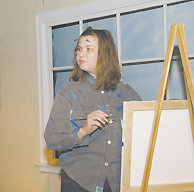 |
photo by Colburn ImagesThe disheveled, phobic and non-communicative Mrs. Paddy (Niji Ramunas) is one of an assortment of suffering souls housed in a mental institution. |
 You’ll be charmed by these lunatics
You’ll be charmed by these lunatics
reviewed by Jane Elkin
John Patrick’s timeless comedy The Curious Savage, which has been delighting audiences for over half a century, continues the tradition through October 3 at Colonial Players of Annapolis, with a strong cast under the direction of talented newcomer Gwen Morton.
Set in an elite mental institution, the story is for all you underdogs, dreamers and optimists. If you refuse to let cynicism infect your faith in humanity … if you believe in the promise of justice and the renewal of hope … if your mischievous side wants to shake those who don’t … then you will love this show and its star, the eccentric heiress Ethel Savage, beautifully portrayed by Joan Hamilton-Townshend.
Ethel, a child bride who always put family before self, believes it’s never too late to become what we might have been, if we can only get past old wants. Thus she charges into widowhood with a passion for the stage and philanthropy that her family finds most undignified — and inconvenient. When she squanders a small fortune on a “happiness fund” to make dreams come true, her three spoiled step-children, Sen. Titus Savage (Danny Brooks), Judge Samuel Savage (Rick Hall) and socialite/serial bride Lilly Belle Savage (Jeanne Louise) have her committed. But as the good Dr. Emmett (Lisa KB Gilbert) recognizes, it’s hard to say where reason ends and madness begins.
Ethel brings joy and a teddy bear to her new home, where she could be happy if only she were free to leave. For just as this institution’s inspiration, the McLean Hospital in Belmont, Mass., housed such luminaries as John Nash, Sylvia Plath and James Taylor, this refuge is populated with a likable assortment of suffering souls.
There is the decorous and delusional Florence (Josette Dubois) who mothers a baby doll; the mathematician Hannibal (Eric W. Alexis) who never tires of scratching out a two note serenade on the violin; the delightfully dingy dreamer and pathological eavesdropper Fairy Mae (Kirra Sharpe); the dashing war hero Jeffrey (Samuel Gillam) who suffers such PTS-induced guilt that he cannot accept even the love of his devoted nurse Wilhelmina (Ashley C. Hodak); and the disheveled, phobic and non-communicative Mrs. Paddy (Niji Ramunas).
Ethel adopts them, enriching their lives as they do hers, even as she plots her escape. Confident that there are a million things a man won’t do for five dollars, but there aren’t five things he won’t do for a million, she forces a compromise with her children by burying the remaining $10 million of her fortune. The result is bedlam.
So what will it be for poor Ethel: Liberty or a permanent vacation? I’m not telling, except to say it would be madness to miss this show.
Playing thru Oct. 3 at 8pm ThFSa; 2pm Su @ Colonial Players, Annapolis. $20 w/discounts: 410-268-7373; www.cplayers.com.
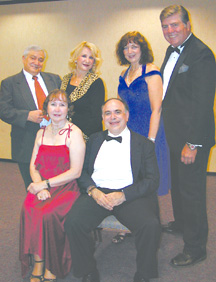 |
photo by Joanne Wilson
|
Guests leave 2nd Star’s Dinner Party hungry
reviewed by Jane Elkin
Levity is seasoned with solemnity in The Dinner Party, Neil Simon’s 31st play and 2nd Star Productions’ plat du jour, as the king of comedy asks the meaty questions at the heart of all enduring relationships:
First, what are the worst and the nicest things your spouse has done for you? And second, would you choose that partner all over again?
It should be a gourmet spread, and the opening is strong. Yet we guests leave still hungry for more.
Set in the private dining room of a fine Parisian restaurant — the very room where Napoleon conquered Josephine — the play summons three divorced French couples for a surprise reunion. They are kindreds in mind, soul and body: Mariette and Claude share a passion for the written word; Yvonne and Albert share sweet but anxious natures; Gabrielle and André share
. . . well, their intimacy defies description.
The men arrive first: Claude (David O’Brien), a suave bookseller and aspiring author; Albert (Steven Rosenthal), a neurotic rental car agent; and André (Jerry Khatcheressian), a supercilious haberdasher. They have only their divorce lawyer in common, and they hope he’ll introduce them to three lovely dining companions.
Instead, the other guests are their ex-wives: the saucy Mariette (Heidi Toll), a writer of modest talent and immodest success, for which Claude cannot forgive her; ditzy Yvonne (Joanne Bauer), an anxious chatterbox plagued by Albert’s silent stalker routine; and seductive Gabrielle (Heather Tuckfield), a symbolic black widow spinning webs to recapture André.
Emotions flare like brandy in the flame of long-simmering grudges. Neil Simon can make even marital discord funny, as the feud between Mariette and Claude illustrates, when the “communicably challenged” Albert is pressed into service as their hapless liaison. But best of all is Rosenthal’s silent spat with his dinner partner, Bauer. This couple is so convincing you’d swear they really were married.
When the zingers, laughter and tears subside, however, there are casualties in this battle of the sexes. Primary among them is the company’s joie de vivre, and for that I blame director Charles W. Maloney. Simon’s writing, even when serious, demands a light touch, and this production turns ponderous.
Underlying the malaise is Maloney’s failure to embrace the Frenchness of the play. There’s a reason it’s set in the city of love. But these characters play as stock Simon-esque urban Americans. Even poor Albert’s name is mispronounced in the American fashion. Only Khatcheressian, with his native Lebanese accent, seems remotely cosmopolitan.
Another confounding choice is the intermission just a half hour into a 90-minute, one-act show, breaking the mood just as actors and audience are getting warmed up.
If the cast can relax into their romantic misadventures, this show could be very satisfying. But this Dinner Party opened with caviar hors d’oeuvres followed by an entrée of chipped beef.
Playing thru Sept. 19 at 8pm FSa; 3pm Su @ Bowie Playhouse, Whitemarsh Park, Bowie. $20; rsvp: 410-757-5700; www.2ndstarproductions.com.
At the Copa, Copacabana . . .
Annapolis Summer Garden Theater gets it right in this comedic melodrama
reviewed by Jane Elkin
It’s true what they say. You can’t judge a book by its cover. When I heard that the Annapolis Summer Garden Theater was staging Barry Manilow’s Copacabana, I thought, They’ve got to be kidding. Who wants to suffer through two hours of schlock?
Then my editor assigned me to review it, so I went — like a cat to the vet — and discovered that I was wrong. I liked it. I really, really liked it. It was peppy. It was fun. It was comedy and melodrama rolled into one, with a dynamic cast and strong direction. It was all I could ask for.
If you’ve ever heard Manilow’s 1978 disco hit of the same name, and who hasn’t, you already know the plot. Jack Feldman and Bruce Sussman’s stage version is better, though, with 3-D characters and a better ending. And Manilow, mercifully, went light on the schmaltz in this musical. His signature style is evident in only two numbers: “Who Needs to Dream” and “Sweet Heaven,” both of which sound refreshingly sincere when belted by Nathan Bowen as Tony.
Bowen’s rich baritone has just the right edge to arouse and sustain interest as predictably boy gets girl, loses girl and saves girl. His performance is smooth and compelling through ballads and up-tempo show stoppers like “Dancing Fool.”
Nicole Anderson as Lola is as captivating for her spot-on singing and dancing as for her personal charm. When Tony coaches her through a convincing audition with an awful song, the hilarious “Man Wanted,” they become the adorable couple who make beautiful music together. Then the villainous Rico (Kevin Wallace) sweeps her off to Cuba in a most dishonorable fashion.
Wallace is so perfectly sinister that his vocal insecurity in the brief, “Bolero D’Amore” is inconsequential — the song being incidental to his shocking depravity. As his spurned paramour, Conchita, Alicia Sweeney (on my night at the theater) is by turns caustic and sympathetic. Despite all the right moves and delivery in her big production number, Havana/Caramba, she is too old to hold his interest. Sniff, sniff. This man is Trouble.
Rounding out a strong cast of leads are comedians Emily Sergo and John Cestone as the sassy cigarette girl, Gladys Murphy, and cantankerous club manager, Sam Silver. Sergo’s Copa Girl comes off as strong as cheap perfume, and I mean that as a compliment.
Director Jerry Vess, a veteran of Chesapeake Music Hall’s production, delivers a fog-shrouded sense of romance and dualistic morality with the 1940s, palpable in every glitzy costume and tightly choreographed jazz move. My only complaint with this show is the uneven orchestra that sometimes overpowers Sweeney and Bowen.
Standout performances from the fine chorus include exuberant dancing by Morgan Christina Thomas and Justin Binnix’s horrid audition that has the audience in stitches.
Speaking of which, if you haven’t yet bought a chance on the two hand-stitched quilts being raffled to raise money for the Annapolis Summer Garden Theatre’s building fund, there’s still time. See Copacabana, and whether or not you win the prize, you will still go home richer.
Quilters at Annapolis Summer Garden Theatre
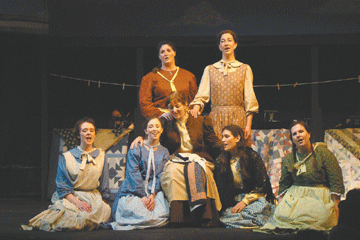 |
photo courtesy of Annapolis Summer Garden TheatreKatherine Kranz, Erika Knepp, Meghan Taylor, Josette Dubois, Heidi Toll, Katrina Sillaman and Erica Smith |
If you’re a prairie kind of gal, this show is for you.
reviewed by Jane Elkin
Annapolis Summer Garden Theatre shifts away from its usual fare with Quilters, a show by women, about women and for women. If folk music is the marrow of your bones, if you love stitchin’ and bitchin’, if you think you would have made a terrific pioneer, this show is for you. Even so, you risk a surfeit of mellow. Despite a Tony nomination for Best Musical of 1984, the show lasted just three weeks on Broadway, most likely due to its mawkish story.
This patchwork of stories by Molly Newman and songs by Barbara Damasher builds a metaphor for life around quilting designs with such descriptive names as “Tree of Life.” Practical as buckskin, the art was rich in color and texture, and as decorative as circumstances allowed.
The premise presented by Sarah (Heidi Toll) and her six “daughters” cum everywomen is simple: Life is tough and then you die … with a little diversion along the way. Thus we toil with Erica Smith in “Building a House.” We mourn with Josette Dubois in “They Brought Him Home in a Bushel Basket.” We laugh with the tomboy Meghan Taylor in her fantasy of calico carnage, “Sunbonnet Sue.” We cry with Erika Knepp and Katrina Sillaman in the orphan’s tale, “Butterfly”. We shudder for Sillaman’s victim of forbidden family planning in “Secret Drawer.” And we fall in love with the cowboy courter in “Lone Star,” Katherine Kranz’s hilarious channeling of John Wayne in a dress.
Tightly woven vocal harmonies embroider each story, sometimes accompanied by a versatile three-man band, but often a cappella, the musical equivalent of performing without a net. Here Knepp’s extraordinary soprano leads the ensemble just as the constellations led the wagon trains, her voice bright and shining as the North Star and haunting as the coyote’s howl. Other notable soloists include Sillaman in “Quiltin’ and Dreamin’”; Kranz for her soliloquy of invention, “Green, Green, Green”; Dubois in “The Windmill Song”; and Toll in “Who Will Count the Stitches”?
When the music, often hymn based, gels in such ensemble numbers as “Baptism, Never Grow Old” and “The Lord Don’t Rain Down Manna,” it rings the rafters, so unified it is impossible to tease out the individual lines. However with no clear instrumental introductions or musical direction, some of the songs on opening night felt more basted together than finished.
Musical rewards aside, the staging is disappointing for its stasis. With minimal props, dances that drag and a dearth of special effects broken only by an apocalyptic inferno, the silence between the songs and sketches stifles.
The finale, where the finished quilt is hung for display, is a visual and auditory highpoint that serves as both epilogue and advertisement. Two such quilts, both stitched by the Annapolis Quilt Guild, are being raffled to benefit the theater’s Stage 2 building project. So even if you don’t see the show, it is still worth the trip to the box office to buy a chance on these beauties. If you’re a prairie kind of gal, you ought to stick around for the show.
Directed by Marie Sproul. Music by Rachel Sitomer. Playing thru July 26 at 8:30pm Th-Su @ Annapolis Summer Garden Theatre, Annapolis. $18: 410-268-9212; www.summergarden.com.
Spotlight on Colonial Players
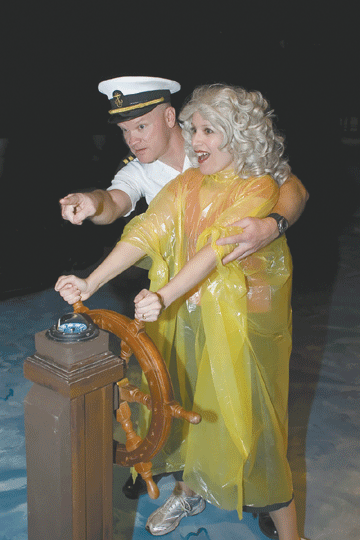 |
| It is well worth embarking on the theatrical journey to get to the sweet ending after the absurdities stop. |
reviewed by Davina Grace Hill
“My plays tend to be peopled with outsiders in search of clarity,” Playwright David Lindsay-Abaire has said. That pretty much sums up the theme of Wonder of the World.
A wife unexpectedly leaves her husband for a bus trip to Niagara Falls hoping to find her destiny and the meaning of life. She meets quirky characters along the way. That pretty much sums up the plot of Wonder of the World.
A fan of Preston Sturges, Lindsay-Abaire can turn a phrase or a situation with similar ease. Not surprisingly, precise timing is the key to success in staging his work. For the most part, Director Ron Giddings has succeeded. The inventive seven-member cast works best as an ensemble, seeming to take security from each other amidst the zaniness bouncing around them. Duet scenes, however, are a little stilted.
The opening scene between the wife, Cass (Laura Gayvert) and the husband, Kip (Thurston Cobb) didn’t work on opening night. Perhaps it was jitters that they will grow past. The second scene, on the bus, Cass meets Lois, a suicidal woman traveling with a barrel to Niagara Falls, the pace picked up but still felt stiff.
Once the audience was engaged (rain ponchos, water sprayers and cameras are provided for audience interaction) and the boat Captain Mike (Greg Garcia) was introduced, along with mysterious Karla (Carol Cohen) and Glen (Bob Brewer), the production took charge of the trip.
Alicia Sweeney stands out for bizarre costuming and deadpan timing. Not much more can be said about her waitresses and therapy counselor without ruining gags that must be seen to be appreciated.
Carol Cohen and Bob Brewer are also excellent, providing quirky eccentricities and visual comedy that defies reason but tickles the funny bone.
CeCe McGee’s Lois is interesting: a stumbling lush in one moment, a sad, poignant woman the next, a challenging, assertive force throughout. McGee manages to walk the tightrope of a complex character and make you laugh at her while really liking her.
Greg Garcia’s Captain Mike is a fine straight man amid the craziness.
The central married couple, Gayvert’s Cass and Cobb’s Kip, have little spark between them and that robs the production of meaning and intensity.
You’ll see actors on a boat, in a hotel room, three theme restaurants, two helicopters, a bus, a car and a bedroom, all in theater in the round; that is quite an accomplishment for Colonial Players’ technical crew.
It is well worth embarking on the theatrical journey to get to the sweet ending after the absurdities stop.
Note: The production runs two hours without intermission and with adult language and themes.
Playing thru June 28 at 8pm ThFSa; 2pm Su; 7:30pm June 21 @ Colonial Players, Annapolis. $20; rsvp: 410-268-7373.
|
Spotlight on Smokey Joe’s Café
Foot-tapping fun at Annapolis Summer Garden Theatre
reviewed by Davina Grace Hill
Baltimoran Jerry Lieber has teamed with many musical partners, but Mike Stoller made them a duo whose songs everybody knows.
Blending humor, theatricality and the emerging sounds of rock and roll with blues rhythms and writing for performers as diverse as the Coasters and Peggy Lee brought Lieber and Stoller numerous chart-topping hits. In 1995 a theatrical-musical review was made of their hits. After 2,036 performances on Broadway and multiple Tony Award nominations, the soundtrack went on to win a Grammy. Now Annapolis Summer Garden Theatre brings Smokey Joe’s Café to Annapolis.
The show is light on plot but rich in recognizable, foot-tapping music. Words overheard in the audience — I didn’t know all those songs were by one team — sum up the effort. Astonishing that all those memorable songs came from one songwriting partnership.
The cast of eight has a fabulous time and shares the fun with the audience. Each has individual memorable musical moments, but the ensemble makes the show click. In particular, the four men work best as an ensemble, and they tear up the stage with charisma, choreography and bravado. The best high-energy moment is this male quartet “On Broadway.”
Individual highlights include Peter N. Crews working the emotions of “I (Who Have Nothing)”; Andre Hinds rocking out “Jailhouse Rock”; Nathan Bowen evoking all the right poignancies in “Spanish Harlem”; and Vincent Musgrace’s “Ruby Baby.”
On the women’s side, the quartet showstopper is “I’m a Woman.” Individually, Lauren Behringer’s powerful “Pearl’s a Singer” will break your heart. Becca Vourvoulous has a huge theatrical voice, but her dancing in “Teach Me How to Shimmy” is unforgettable. Lisa Renee Thomas is in full good-humor in “Don Juan,” and Chelsea Mitchell rocks out the end of the first act with “Saved.”
Director, choreographer and set designer Jason Kimmel makes good use of the set and choreographs well for the small space. The strong voices are not always well balanced (a difficult thing do to with so many good voices), but overall the sense of joy in the production is captivating.
Usually the performers are the stars. In Smokey Joe’s Café, Anya Nebel shines equally bright, with multiple, appropriate and effective costumes. The barely seen and always excellent musicians who accompany the production also deserve recognition for excellent work.
If you want a night of foot-tapping fun, Smokey Joe’s Café is the place.
Music director: Ken Kimble. Stage manager: Melissa Huston. Lighting designer: Phil Perron.
Playing thru June 21 at 8:30pm Th-Su @ Annapolis Summer Garden Theatre, 143 Compromise St., Annapolis. $18 w/age discounts: 410-268-9212; www.summergarden.com.
2nd Star Productions’ Man of La Mancha
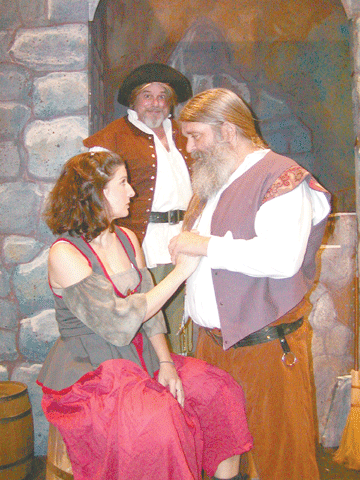 |
photo by Joanne WilsonA jaw-dropping cast of operatic talent makes up this production. Michael Galizia as Don Quixote (right), Christine Asero as Aldonza and Brian Douglas as Sancho. |
2nd Star reaches the unreachable star
reviewed by Jane Elkin, June 4, 2009
Four hundred years ago, Miguel de Cervantes conceived the character of Alonso Quijana, a country squire who “lays down the melancholy burden of sanity … to become a knight-errant … to raise up the weak and those in need as the dauntless knight Don Quixote.”
In 1966, Dale Wasserman, Joe Darion and Mitch Leigh transformed Cervantes’ story into the blockbuster musical The Man of La Mancha. Now 2nd Star Productions transports and transforms you with sublime poetry and song set amidst the Spanish Inquisition.
Go with a loved one or go alone, but go you must, for ‘twould be folly to miss it.
Directors Jane B. Wingard and Donald K. Smith have assembled a jaw-dropping cast of operatic talent, chief among them Michael J. Galizia as Don Quixote. If God has a voice, this is it: resonant and commanding, yet gentle. Galizia is hypnotic in his signature songs, “Man of La Mancha,” “The Impossible Dream” and “Dulcinea.” Even his speech leaves the ears hungry for more.
Brian Douglas, Quixote’s endearing sidekick Sancho Panza, is splendid in “A Little Gossip,” “I Really Like Him” and his accapella “Missive.” Christine Asero — as Aldonza and Quixote’s ‘Lady’ Dulcinea — is every inch the hard-edged wench transformed by his homage. Despite some opening night Act I vocal tension in “It’s All the Same” and “What Does He Want of Me”, she blossomed in Act II with the self-loathing anthem “Aldonza” and redemptive “Dulcinea” reprieve. Her dancing in the crucial rape scene is lyrical and effortless.
Among a cast of fine secondary leads, John Day — as the Padre — is exquisite in “The Psalm,” “To Each His Dulcinea” and the quartet “We’re Only Thinking of Him,” which he shares with the talented Pamela Day (Antonia), Carole Long (Housekeeper) and Andrew Gravatt (Dr. Carrasco). The haunting folk song “Little Bird, Little Bird” — featuring Zachary Fadler as Anselmo, Wendell Holland as Pedro and guitarist Al Zarate — pleases like a favorite spice. Longtime local favorite Ed Wintermute (Innkeeper) and Kevin Cleaver (Barber) round out the supporting cast, with an exceptional chorus too numerous to mention.
Wingard has created a tableau rich in colorful detail, more like Rembrandt’s The Mill than Picasso’s minimalist Don Quixote. Despite strong imagery, though, the show would benefit from more dynamic blocking and pacing and a tighter orchestra. Still, attention to diction, body language and choreography renders many of the supporting characters and songs unforgettable, from the whimsical clogging horses (Brian Jollie and Sean Hill) to the hypnotic Moorish dancers and inspirational ensemble finale.
Bring your hankies and a philosophic mind. For as Cervantes says, When life itself seems lunatic, who knows where madness lies? Maddest of all is to see life as it is and not as it should be.
Playing through June 27 at 8pm FSa, 3pm Su @ White Marsh Park Theater, 6314 Crain Hwy., Bowie. $20. 410-757-5700; www.2ndstarproductions.com.
Play reviewer Jane Elkin is also a professional singer.
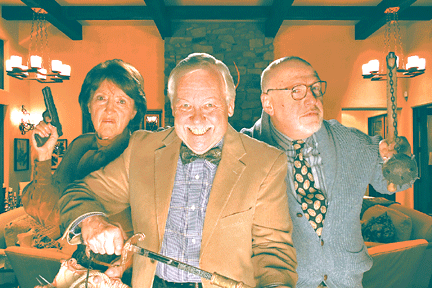 |
photo by Colburn ImagesThree aging British mystery writers bemoan the genre’s loss of elegance and intricacies. Then two of them commit the perfect murder. |
 Colonial Players’
Colonial Players’
Over My Dead Body
A most lively performance
reviewed by Davina Grace Hill, May 28, 2009
The mystery genre creates quirky, supremely insightful individuals who can be counted on to figure out who committed murder. Fondness for this kind of character creates legions of dedicated fans.
What makes Colonial Players’ spring mystery, Over My Dead Body, work so well is the audience’s fondness for the three central characters, especially Edd Miller’s Trevor Foyle.
The plot involves three aging British mystery writers who bemoan the slippage of the genre into tawdry and anatomically precise language, losing the elegance and intricacies of the gentler craft they once led. A brash writer of the new style and an even more brash American publisher’s agent arrive on the scene to rub the proverbial salt in their literary wounds.
Writers Trevor Foyle and Dora Winslow (Janet Berry) mistakenly believe the American to be a serial killer and conspire to kill him. The dual purposes of their daring are showing off the elegance of a well-crafted murder and seeing if they can get away with it.
If they don’t? They figure at their age, they won’t have to do much time.
Their perfect murder entails stabbing, shooting, hanging, poisoning, locked rooms, knocked over bookcases, incriminating photographs and a gorilla suit.
Edd Miller’s depiction of Trevor Foyle is full of zest and earnest playfulness; he propels the show from beginning to end. Janet Berry’s Dora Winslow is an excellent foil for Miller. Ken Sabel plays the third writer, Bartie Cruikshank, as slyly as the character turns out to be.
Jeff Sprague’s Simon Vale, a young British writer of the new genre, transitions well from a nondescript character to a most gleefully sinister one. Erik W. Alexis as the American agent Leo Sharp does a wicked turn as a disco-Miami Vice playboy. He has the audience at his entrance in a white suit (tie-less and jacket sleeves rolled up), and he never lets go.
Once the murder is committed, the police have to figure it out. Joe Thompson as Detective Inspector Smith and Stephanie Nevin as Detective Sergeant Trask do an excellent job of figuring as the audience watches.
The last member of the cast is the requisite butler. Ray Fulton as Charters styles his character almost into slapstick while the rest of the cast works more realistically. This was jarring initially, but the laugh-out-loud experience — watching him sink impossibly low into a cushioned chair or bend down to place a tray on a table — overcame the clash of styles. He is physical comic relief.
Both cast and the typically resourceful set crew have a great energetic, fanciful time, and the audience happily joins in.
Recession? What recession? Colonial Players gleefully kills any worries for a few hours.
Director: Joan Hamilton. Stage manager: Herb Elkin. Lighting designer: Harvey Hack. Set designer: Doug Dawson. Production manager: Mary Beth Yablonski.
Playing thru May 30 at 8pm ThFSa; 2pm Su @ Colonial Players, Annapolis. rsvp; $20 w/discounts: 410-268-7373.
Candida: A Philosophical Frippery
reviewed by Jane Elkin
Candida, a comedy about social and sexual equality in Victorian England, sounds as if it should now be pointless. But in George Bernard Shaw’s enlightened hands it is surprisingly relevant to modern sentiments. For despite feminism and the intervening sexual revolution, its themes of male/female relationships in friendship, marriage and temptation are timeless.
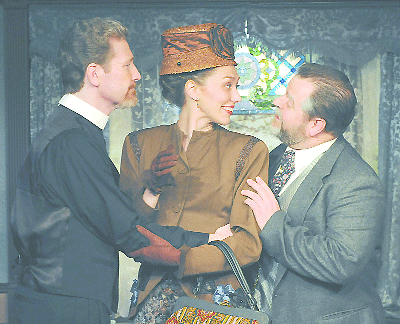 |
photo by Stan BarouhJames (Carl Randolph) educates wife Candida (Vanessa Morosco) to be a free-thinker while father-in-law Burgess (Joe Cronin) courts James’ political influence. |
![]() Nonetheless, the two-hour run-time may be longer than the Twitter age cares to devote to drawing room debate, which is not to denigrate the performance, but rather the ponderous language. Bay Theatre’s artistic and managing director Lucinda Merry-Browne infuses this classic with brisk pacing, an opulent set, stunning costumes and animated characters. Still, the whole falls just short of rousing.
Nonetheless, the two-hour run-time may be longer than the Twitter age cares to devote to drawing room debate, which is not to denigrate the performance, but rather the ponderous language. Bay Theatre’s artistic and managing director Lucinda Merry-Browne infuses this classic with brisk pacing, an opulent set, stunning costumes and animated characters. Still, the whole falls just short of rousing.
You’ll recognize these personages. The capitalist, the poet, the activist, and the queen bee are timeless characters who simply change their rhetoric and garb to suit the changing times: thus The Donald, Dylan, Ghandi and Oprah.
Take our heroine, for instance, Candida (played by Vanessa Morosco). She is the ideal woman: confident, radiant, compassionate and wise. A rarity in Victorian England, she is also mistress of her home in partnership with her husband, the Rev. James Morrell (Carl Randolph), who educates her to be a free thinker.
James is a forceful man in his own right, evoking strong reactions from devotees and detractors alike. His spinster secretary, Prosperine (CeCe McGee), adores him from afar. His young pastoral assistant Lexy (Jared Mercier) idolizes him. And his industrialist father-in-law Burgess (Joe Cronin) scorns his socialist politics even as he courts his political influence. Yet despite his great influence, James knows he would be nothing without Candida, and that is both his blessing and his problem. For what is half of a power couple but one crippled soul?
The jewel in James’ crown is too attractive to the competition, a certain dewey-eyed young poet he rescued from the streets, one Eugene Marchbanks (Dan Stowell). Marchbanks wants to put Candida on a pedestal, remote from what he perceives as domestic toil and empty promises. Is there a young mother who might not be flattered by such devotion? Candida may be wise but she is, after all, only human. Are there many husbands who would dare test her devotion?
Life is full of choices. How do we weigh our wants against our obligations? How often are we really offered a choice, and if granted it, would we change our circumstances? Candida decides that her love belongs where it is most needed. To find out just where that is, you’ll have to see the show.
Playing thru May 30 at 8pm Th-Sa; 3pm Su @ West Garret Building, Annapolis. $25: 410-268-1333.
The Gin Game at Bay Theatre Company
See it and you’ll be one of the lucky
reviewed by Jane Elkin
Some people are just lucky.
Just ask any failure.
Or Ask Weller Martin, the grouchier half of D.L. Coburn’s Pulitzer Prize-winning tragicomedy, The Gin Game.
|
Weller (Paul Danaceau) is a bit of a loner in the ramshackle retirement home where he lands after a string of bad luck. He calls the place “a warehouse for the intellectually and emotionally dead.” He can be charming and funny that way, when he’s not playing solitaire to escape his solitude. He prefers gin rummy, but you can’t play that alone, so he’s thrilled when Fonsia comes along.
Fonsia Dorsey (Rena Cherry Brown) knows a thing or two about bad luck, herself, but not so as she’d talk about it. The timid shell of a woman brightens considerably when Weller invites her to play. He delights in his fresh patsy, until he discovers she’s a natural. Then his darker side emerges. At first it’s just ominous rumbling; eventually, the storm’s full fury descends on her. For he can’t stand to lose, and she can’t resist his overtures for “just one more game.”
They become codependents in a dysfunctional dance where Weller, like all abusers, repeatedly pushes his victim to her limits, then apologizes, thus breaking down her notions of normalcy and decorum. Despite Fonsia’s mounting discomfort, she keeps coming back for more because it beats the alternative, which is loneliness. The promise of romance escalates to mutual misery as they alienate each other with vindictive goading.
Set designer Ken Sheets has done a masterful job recreating the crumbling porch where they square off day after day. Complete with a neglected garden and leaky roof, it’s missing only live crickets. Likewise, director Lucinda Merry-Browne’s staging emphasizes the interface between characters as they swing between extremes of temperament.
But in a play where range is key to blurring the lines between quirkiness and insanity, outrage and aggression, Danaceau’s tantrums lack the raw anger to be convincing. Underneath all the hysterics and invectives, I still suspect he’s a really nice person. Brown’s performance, on the other hand, is seamless as she transitions from girlish frail to harpy.
In fairness, the theater experience was interrupted midway through the first act, when a playgoer became violently ill and had to exit in an aromatic cloud. That misfortune threw off everyone’s rhythm — which just highlights Bay Theatre’s need for a larger space. The play still held me in its grip and in my seat.
Playing thru March 28 at 8pm FSa; 3pm Su; 3pm & 8pm March 28. @ Bay Theatre Company, Annapolis. $30 w/discounts:
410-268-1333.
No Sex Please, We’re British
reviewed by Jane Elkin
No Sex Please, We’re British is a dated comedy of errors entangling innocents in an illicit postal pornography ring. A G-rated burlesque of sexual innuendo and slapstick humor, Alistair Foot and Anthony Mariott’s 1971 play delighted British audiences for a decade. That would be the same decade that brought us The Benny Hill Show.
Not quite the stuff of Masterpiece Theatre, it was roundly panned by British critics and flopped on Broadway after just 16 performances.
|
|
It’s not everyone’s cup of tea. But if you get it, you can’t get enough.
The story unfolds in a groovy pad — decorated in heinous ‘70s’ fashion by Jane B. Wingard — above the bank where our hero works. Newlyweds Peter and Frances Hunter (played by Ron Howard lookalike James Poole and true Brit Lesley Miller) are settling into their love nest.
A visit from Peter’s priggish coworker Brian Runnicles (Steven Bradford) cuts short their blissful solitude. Runnicles, as the hapless victim who signs for the first package of unsolicited pornography, he is drawn into a web of lies spun by the Hunters to protect Peter’s reputation and job.
A parade of uninvited guests follows: the prying mother-in-law Eleanor Hunter (Susan S. Porter); Peter’s boss Leslie Bromhead (Jerry Khatcheressian); Police Superintendent Paul (Al Chopey); the bank examiner Mr. Needham (the seriously funny Wendell Holland); the ubiquitous deliveryman (Mark McKaye); and a couple of tarts, Susan (Rosalie Daelemans, a knockout in garterbelt) and her apprentice Barbara (Ginger Andrews.)
You can bet your bippy that public propriety is compromised by bawdy bedroom pranks. Yet nudity and profanity are conspicuously absent. For as Frances Hunter muses while perusing dirty books, I know they call it a permissive society, but they never say who gave permission. Who wants to see such things?
Judging from audience reaction, not many.
Yet a boisterous minority on opening night was hysterical with laughter, twittering with anticipation whenever someone was slipped a mickey and guffawing with glee to see bustier-clad hookers riding piggy-back on bankers.
Director Charles W. Maloney revels in the suggestiveness of this script. But he dropped the ball in allowing wildly inconsistent accents, which rob the story of its already tenuous credibility.
2nd Star has produced 48 plays since its founding in 1996. Yet amid this economic slump, the often-praised company’s continuation is uncertain. To stay alive, they need to satisfy their target audience. So the success of this bedroom farce plays into their future.
Playing thru March 14 at 8pm FSa; 3pm Su @ White Marsh Park, Bowie. $20: 410-757-5700; www.2ndstarproductions.com.
Les Liaisons Dangereuses at Colonial Players
Sex, Lies and Letters
reviewed by Jane Elkin
|
![]()
Colonial Players production for this Valentine’s season, Les Liaisons Dangereuses, is a blockbuster bodice ripper that will captivate and titillate. Christopher Hampton’s stage adaptation of the classic French novel by Pierre Choderlos de Laclos is a decadent peek at the intimate lives of the hedonistic French aristocracy on the eve of the Revolution. Director Craig Allen Mummey pulls no punches in his depiction au naturel of the sport of seduction.
Andrea L. Elward and John Halmi are brilliant as the self-proclaimed virtuosos of deceit, La Marquise de Merteuil and her erstwhile lover, the lothario Le Vicomte de Valmont. They gleefully entangle innocents in their webs and beds, ascribing to the philosophy that love is something you use, not something you fall into like quicksand. Despite the gravity of their business, their witty repartee and exquisite sense of timing and phrase delight the audience, for this playwright is quite a master of double entendre.
Principal victims are Cécile de Volanges (Avra Sullivan), the ingénue whom Merteuil arranges to have deflowered in vengeance against a third party, and Mme. Tourvel (Becki Placella), a virtuous beauty of irreproachable character who is the primary target of Valmont’s sport. Both are adorable and sympathetic victims, but Sullivan’s fall from grace is more believable for her complicity. Placella overacts her tortured remonstrations to the point that they seem more orgasmic than distressful.
Under the blind watch of Cécile’s convention-bound mother, Mme. De Volanges (Sue Struve) and Valmont’s doting aunt, Mme de Rosemonde (Heidi Toll), the triumph of evil is assured. Throw in one ancillary victim and two accomplices, and the ingenious plot boggles the mind. Jeremy McKoon as Le Chevalier Danceny is a fitting match as the witless suitor to both Cécile and Mme. Merteuil, and Josette Dubois and Jeff Sprague are delicious as Émilie, the dispassionate courtesan, and Azolan, Valmont’s corrupt servant and accomplice. As representatives of their class, such a cast of characters begs little sympathy for their annihilation at the guillotine.
For a show whose historical ambiance is remarkable, one detail stands out. This costume drama is pulled off with magnificent effect by Linda Swann, who attired the principal characters in colors associated with the seven deadly sins: pride (violet), wrath (red), lust (blue), envy (green), sloth (light blue), gluttony (orange) and greed (yellow). On a sour note, however, the show’s one fantastic failure is a feeble sword fight that robs the finale of its intended climax. When the rapiers start to clang, close your eyes and just imagine Errol Flynn so as not to spoil the illusion.
Les Liaisons Dangereuses is entertaining and engrossing from start to finish, if a bit long. It runs over two-and-a-half hours with just one intermission. But don’t let that stop you.
Playing thru Feb. 28 at 8pm ThFSa; 2pm Su; 7:30pm Feb. 15 & 22 @ Colonial Players, Annapolis. $20; rsvp: 410-268-7373.
top
© COPYRIGHT 2009 by New Bay Enterprises, Inc. All rights reserved.
 photo courtesy of Bay Theatre Company
photo courtesy of Bay Theatre Company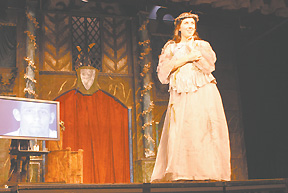
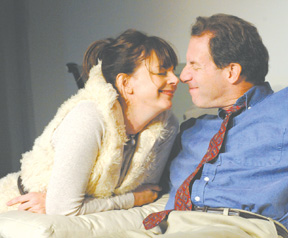
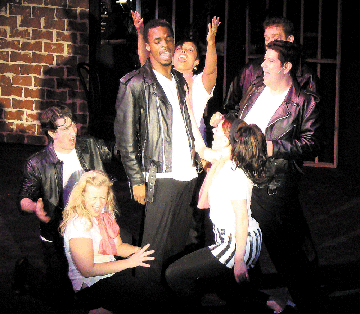 photo courtesy of Annapolis Summer Garden Theatre
photo courtesy of Annapolis Summer Garden Theatre photo courtesy of Bay Theatre Company
photo courtesy of Bay Theatre Company
 photo by Colburn Images
photo by Colburn Images